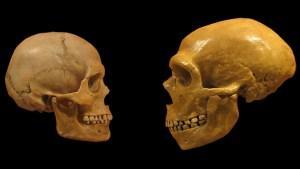Another week goes by, another boat load of research on our ancestors. Here are the highlights:
- Did Neanderthals have medicine? Previous studies have found that they ate food that could have had medical benefits. However, a study on chimps have found that they seem to eat these foods for other reasons. Although they don't rule out the medication hypothesis, it seems that the picture might not be as clear as we thought (source)
- Evolution doesn't always push animals to adapt. Sometimes neutral changes can accumulate by accident. A new review of our faces has found that this sort of neutral change was what led to the development of our (and Neanderthals') face. There was no adaptive reason for them, it was kind of an accident (read more)

- Being smart might not always be a good thing. A simulation revealed that individuals with more knowledge of an environment were less likely to go and explore new ones (or even explore unexamined areas of their current environment). Instead they stuck with what they knew, potentially missing out on all sorts of exciting new things (source).
- For the first time the family of a wild chimp with a congenital disorder has been observed. This young infant had symptoms consistent with a Down syndrome-like condition. Despite this, her family and troupe still treated her normally. This is very different to these sorts of cases in captivity, where infants with these sorts of conditions are often neglected (read more)
- A series of experiments has found that humans punish one another for revenge and to restore balance. When given the option, participants often picked punishments that would put both individuals on an equal footing. However, when not given this option they still punished each other; suggesting they also want a bit of revenge too (source)
- Neanderthhals' intelligence has often been criticsed because they made the same tool for tens of thousands of years. Surely this means they weren't as innovative as us? However, modern human populations have been found using those tools for an awfully long time too. Does this mean that the use of tools for a long time isn't actually a good measure of smarts? (read more)
And finally, the creationists have been up to no good again. They've come up with yet another way to explain away the Homo naledi fossils. This time they're arguing that they're just a bunch of diseased Homo erectus. However, they really have to cherry pick evidence to make this case work. The ongoing disagreement between creationists really reinforces the fact that their worldview is just nonsense. Read more at this clicky

